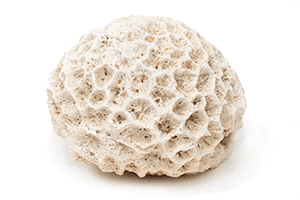Magnesium is the seventh most abundant element in the body following calcium, phosphorous, sulfur, potassium and chlorine. With its 4,190 ppm concentration of fossil stony coral, magnesium contains the third highest amount of fossil stony coral, preceded only by calcium (391,000 ppm) and carbon (119,000 ppm). Magnesium is closely related to calcium and phosphorus in its functions in the body. About 70% of magnesium is contained in the bones and teeth. The remainder of the magnesium is found in the cells of the soft tissue of the body, and is stored in large quantities within the mitochondria, the energy powerhouse of the cells. (Halstead)
“Magnesium”, says Colin Chatsworth, founder of Healthview (an organization dedicated to the furtherance of energy), “is involved in more energy-producing activities than perhaps any other mineral.” Magnesium, along with calcium, is a shock-absorber. It helps prevent the human system from experiencing excessive stress. Without adequate magnesium, the human system would burn out due to over-stimulation. (Healthview) Perhaps the single most important reason why we need so much magnesium is because magnesium – more than potassium or calcium – is an anti-pathogen: an active, disease-fighting agent. It is magnesium’s active, anti-pathogenic, disease-fighting activity that sets it apart from all the others. (Owen) Additionally, this mineral strongly supports the body’s central nervous, neuromuscular and cardio-vascular systems. A lack of this mineral can result in over-calcification of the joints (rheumatoid arthritis), diabetes and constipation. (Lepore) Magnesium is a natural calcium-channel blocking agent; it protects cells from abnormal infusions of calcium, which, in severe instances, can cause cells to die. (Pierce)
Clinical Reference Guide, International Foundation for Nutrition and Health.
Energy, by Healthview, a unique and comprehensive health document.
Fossil Stony Coral Minerals, Bruce W. Halstead.
Heart Healthy Magnesium, James B. Pierce
The Ultimate Healing System, Donald Lepore.
Why Magnesium? Bob L. Owen, “Unpublished manuscript”.
